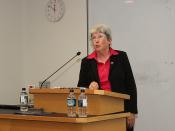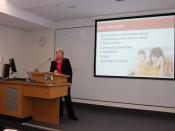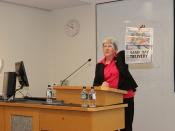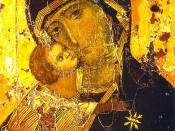ÃÂThe role of religion has been to provide a world view and an understanding of the person and community within that worldÃÂ as stated by Maureen Muldoon (67). Abortion, according to Christian tradition is morally unacceptable; not only does it take a life, but it is also ÃÂdestructive to the moral consciousness and character of a person or people of any nationÃÂ (Muldoon, 68). In Catholicism, abortion is prohibited under all circumstances because it is considered an act of murder. Ultimately, regardless or religion, God does not support abortion judging from the themes of the scriptures in the Bible, such as ÃÂGod as Creator of life, sanctity of life, stewardship, personal and social conscience, responsible conscientious decision-making, covenant demands, compassion and forgivenessÃÂ (Muldoon, 69). However, strict Christian theology may not always be the right path to follow. Although I agree that abortion is morally wrong and there are options to avoid it, in life, there are certain circumstances where I feel it is the womanÃÂs right to give up the child; such as rape, incest, or pregnancy where the motherÃÂs life is threatened.
Christian theology, to some regards, neglects our rights to human freedom.
Christian spirituality teaches us that ÃÂcreation is graceÃÂ and ÃÂeach creature will solicit our reverenceÃÂ (Carmody, 86). The Church preaches that we, as humans, should not take away life because it was GodÃÂs gift to us. It is our duty to protect and cherish the life that was given to us and not to challenge it or take it away; that would be a sin. Sin, ÃÂa disorder or a missing of the mark or a lovelessness that Christian theology has said only human beings can produceÃÂ (Carmody, 86). I believe that sin stems in society when people hate or forget God. In the Bible, it does not say directly that abortion is a sin, but it does suggest that any interference with the creation, or GodÃÂs work, is a sin, which is exactly what abortion does, ends a life given to us by God.
This brings me to the section of Christian theology in which I do not fully support; scripture says that self-interest is also a sin, but I feel that is not so when given at extreme measures. ÃÂCatholicism says that the lives of the mother and baby are equalÃÂ (Clarie, 77). I found this topic to be the most difficult for me to debate on. I feel that if a motherÃÂs health is in danger by being pregnant, then depending on how far along the pregnancy is the mother has a right to let the baby go. One aspect of this controversy points out that ÃÂthe rights of the fetal child to existence should predominate over the rights of its parents to exist fully comfortablyÃÂ (Carmody 124). I would argue that the babyÃÂs life hasnÃÂt yet begun, but technically it has once the sperm reaches the egg, so I do not currently know my stand on this specific situation yet. I believe that whether or not an abortion is a good or bad option depend on each situation. As for rape, the mother should have the right to terminate the baby, if caught early, or adoption should seriously be considered. This situation is one I feel strongly on. The mother did not choose to become pregnant, it was simply a mishap, which was out of her control and she should be granted the freedom to have an abortion if she wishes to do so. However, in most cases, the mother will not choose to abort her child if she has not done so already. The majority of complications are found late in the pregnancy, indicating that the mother has already decided to have the child. Complications will only make the pregnancy heart-wrenching, but I do not feel that any mother, once already choosing to have the child, will give it up due to minor complications. I was able to witness this first hand. My aunty was informed that if she went through with the pregnancy of my cousin, her first born son, there would be complications with her health. However, having a child in your womb can be such a moving experience, that it is often difficult to give up your child; and my aunty didnÃÂt. Consequently, she is unable to move her right arm, but I donÃÂt think she has any regrets about her decision.
Before starting this paper, my opinion was strongly sided with the Catholic Church; however, while delving deep into the topic, I discovered circumstances where I would see abortion as being acceptable, not right, but acceptable. I also began to put the situation on myself; if I was currently pregnant, I would not want to bring a baby into this world. First of all, I am not ready, secondly, I would not be able to support the child, and lastly, I would not be a fit mother at my age and this would ultimately be unfair for the child. As for adoption, I donÃÂt think I would choose this route for myself personally, because I would not be able to give up my child to another parent. If my pregnancy was far enough down the road, I would keep the child, rather than give it up for adoption. Therefore, self-interest as a sin would not be my stand. I feel that women have the right to make a decision on whether or not to have a child and if they feel that it is nearly impossible to successfully raise a child in society, then they may resort to abortion.
Even though I am not fully against abortion, I do feel that it is wrong and everyone should take the necessary precautions to prevent unwanted pregnancies. There are so many birth control techniques out there that would help prevent this situation from arising and it would be irresponsible to be so careless. I do not feel that birth control is wrong at all. It allows people who are not ready for a child or who are uninterested in having a child (making them an unsuitable parent) the opportunity to take control of their lives and have a kid when the time is right. If people took these types of safety measures, abortion would not be so common in our society. I donÃÂt understand how people can be so casual about sex and get pregnant, then ruin something so special and God-given like it was no ordinary day. These are the types of people that should be stopped, because they use no protection to prevent unplanned or unwanted pregnancies. On the upside, I feel that unwanted pregnancies while married should be carried it out to term and given up for adoption because the woman has a support system. Whereas if the woman was single and on her own, being pregnant and trying to make a living at the same time might be a difficult task, so I believe that adoption would not be the best choice for this situation.
Technical difficulties with a fetus that would have hard time living after birth due to mental illness is also a difficult issue to address. I feel that a child with a disorder should not be degraded or regarded as less than any other child, but I do sympathize and understand that caring for a child of this nature will be a challenging task, that many parents are not ready to face. So, I believe that if the couple honestly feels that they will not be able to care for the child and their needs, then there is no other choice than to abort the baby. For example, if the mother was a druggie, and the baby will be born with complications, I feel that the mother has the right to abort the baby because in the end, the baby will be the one who suffers, being born with obstacles to overcome and a mother who is incompetent.
Adding to the abortion controversy, the Feminist theory, the parallel to the Christian theory, points out a different side. The main focus and argument of women is that ÃÂthe battle for the right to abort unwanted children [is] the key struggle in the fight for overall equalityÃÂ (Carmody, 103). It is theorized that if the roles were switched and men were the life givers, the choice of abortion would be theirs, however, they are not, and it is not an open choice. I feel that society has ÃÂno compassionate understanding of a uniquely female sort of sufferingÃÂ (Carmody, 129). It is difficult for people to put themselves in the positions of others and see their perspectives on the situation, so I imagine that men will not be able to fully see the womenÃÂs side of abortion and that is why, Catholic theology, made up mostly by men, is so against abortion; it is easier said than done and under different circumstances, should be allowed.
This is similar to the issue discussed by Engel and Thistlethwaite, relating to our class theme of women and theology, on how women are brought up certain societies to put everyone else before themselves, however, in a different society, this may be a sin labeled as self-denial. Also, Sue Monk KiddÃÂs interpretation of how women of our time are caught in a Deep Sleep, where women are often ÃÂunaware of unfazed by the truth of her own female life, the truth about women in general, the way women and the feminine have been wounded, devalued, and limited within culture, churches, and familiesÃÂ (18). I do feel that women have been in a deep sleep in the past and are only, over the past years awakening to discover sexism in our society, including the Church. It may not necessarily be discrimination, but more a lack of women influence and power. God is ultimately represented as being male and all the positions of power in the Church are dominated by males, leaving the women in the background of the religious world; as Clifford puts it, ÃÂthe judgment about what counts as the criteria for humanness was drown exclusively from male experienceÃÂ (9). Culture, along with religion, plays an important part in our beliefs. For example, I have a friend whose parents decided to abort their first child. Although they were Catholic and followed those beliefs closely, their culture also pressured them to have their first-born be a male. This clearly shows that the importance of which communities we associate ourselves with greatly determine our beliefs, values, and actions in life. We may put some aspects of our life higher than others, but ultimately, the groups we relate ourselves with define who we are and the choices we make in life.
Although society may think that abortion is a simple and careless choice, the decision takes a tremendous toll on the woman, most women, anyway. IÃÂve heard stories from friends whoÃÂve had an abortion or friends who were present with other friends while having an abortion and from what I hear; it is a very traumatic thing. Having to kill your own baby and then to have it sucked out of you is not an experience easily forgotten. I am sure that once will be enough of a learning experience for most women; not wanting to undergo that incident ever again. I feel that the book ÃÂThe Abortion Dilemma: Personal Views on a Public IssueÃÂ summarized this very well; ÃÂA womanÃÂs whole biology, physiology, spirituality, and psychology lean towards the expression of the pregnancy in birth. When that is interrupted by miscarriage or intentional abortion, something in her hurts. It might be repressed or denied, but in a very true sense the woman is the second victim of the abortionÃÂ (Claire, 77).
Why is it that we have so many nuclear plants and hundreds of military weapons being built daily, but that is looked at as alright and not a big deal, but when it comes to women and abortion, there are huge industries revolting against it? In the book written the American Catholics in Public Square, it was summarized well, that in our society there is uneven treatment of public policy issues.
Ultimately, it comes down to one question, ÃÂwhen does a human being become a human being and develop or acquire a soul?ÃÂ (Claire, 73). Does life begin when the sperm meets the egg? Or does it start when the baby exits the womb of the mother? Or sometime in between? When it begins to move? If this question was clearly defined, I feel that I would have a more strong opinion on abortion.
I feel that Maureen summarized my views most accurately. She stated two types of views and this was her second, ÃÂthat the decision for an abortion always has a tragic dimension but calls for compassion if the right to abortion has been exercised; that the decision for abortion should be made between the woman and her doctor based on her moral and religious insights into life; that abortion can be a responsible moral choice; that abortion may be required to affirm and protect the motherÃÂs life and denial of the right to abortion in such situations deprives the person of her fundamental right of human freedomÃÂ (Muldoon, 68).
In conclusion, I feel that abortion is morally wrong, but under certain circumstances, should be allowed. I do not feel that women should be excommunicated from the church if they decide to receive an abortion. It is their choice and as humans, we have that freedom. If women had to have babies when they werenÃÂt ready, more unwanted babies will be born and are more likely to suffer abuse and neglect, which will in turn increase their risk for criminal involvement later on in life. Ultimately, I agree with the Church to a certain extent, that abortion is against God, in that we defy his creation, but I do feel that under extreme conditions, women, in the end, have a say over the life of their child.
Works CitedAmerican Catholics in Public Square, American Catholcs, AmericanCulture:Tradition and Resistance. 2. Lanham: Rowman & Littlefield Publishers INC, 2004.
Carmody, Denise. The Double Cross: Ordination, Abortion, and Catholic Feminism. New York: The Crossroad Publishing COmpany, 1986.
Claire , Miriam. The Abortion Dilemma:Personal Views on a Public Issue. New York: Insight Books, 1995.
Jaffe, Frederick, Barbara Lindheim, and Philip Lee. Abortion Politics: PrivateMorality and Public Policy. New York: 1981, McGraw-Hill Book Company.
Muldoon, Maureen. The Abortion Debate in the United States and Canada. New York: Garland Publishing, 1991.
Myrsiades, Linda. Splitting the Baby. New York: Peter Lang Publishing, 2002.





